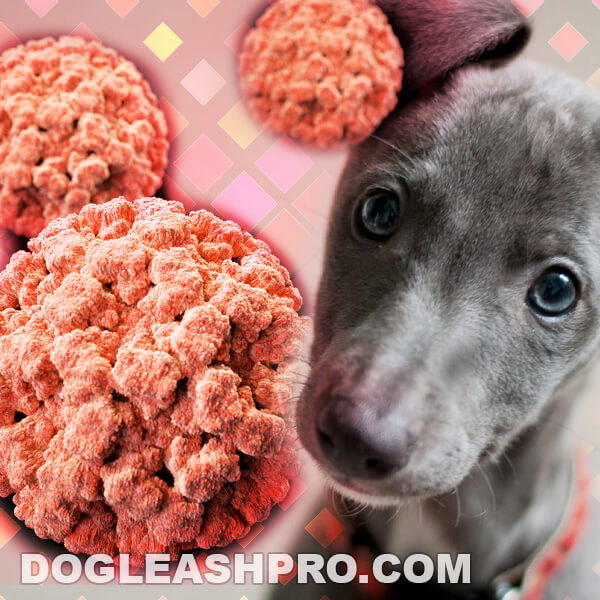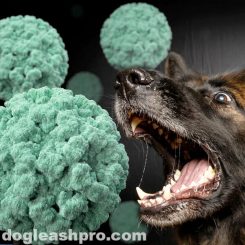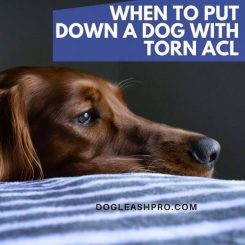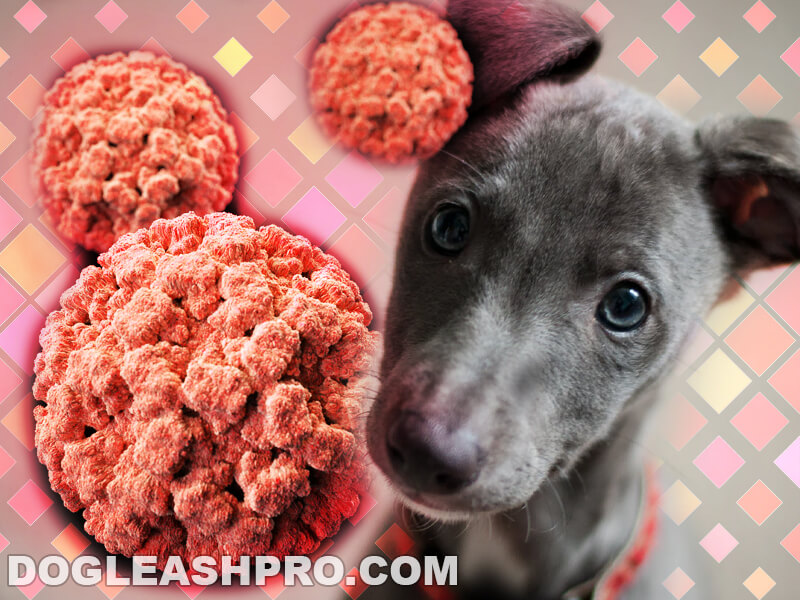
Within the first few weeks of your puppy’s life, he should have received a set of injections to protect him against deadly and contagious diseases like canine parvovirus. There are three Parvo vaccine shots, usually one at 6 weeks, 8 weeks, and 12 weeks. Puppies that haven’t been vaccinated or come into contact with infected dogs may contract parvo. If this is the case, here’s how to know if your puppy will survive parvo.
How do I know if my puppy will survive parvo? You’ll know your puppy will survive parvo when parvo symptoms like vomiting stop, your puppy gains back his appetite, become active again, and no longer has blood in his poop. These are positive signs provided your puppy was properly diagnosed and is receiving treatment for parvo.
Before we continue, it’s important to note that you should contact your vet immediately if you suspect your puppy has parvo. Proper diagnosis and timely treatment, whether at the hospital or curing parvo without a vet for your puppy at home, are crucial for your puppy’s survival.
Table of Contents
Does my puppy have parvo?
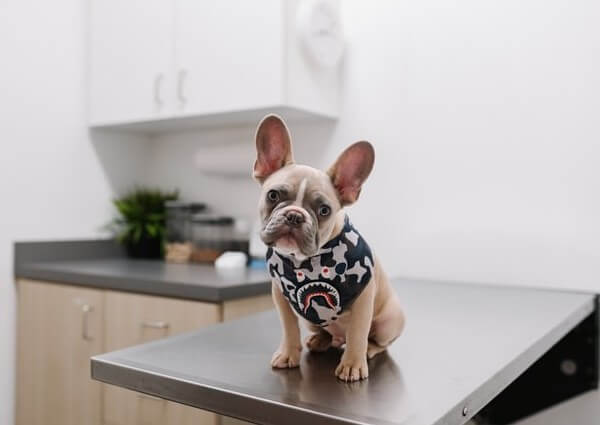
If you suspect your puppy has parvo, you’ll first want to confirm that your puppy actually has this extremely contagious disease. Puppies are more vulnerable to contagious diseases like parvo because their immune systems haven’t had enough time to strengthen and become strong.
Since canine parvovirus or parvo for short is very contagious, your puppy must have caught it when coming into contact with another dog that has parvo whether it was while your puppy was outside for a walk or at a dog park. Another way a puppy can become infected with parvo is if their owner touched or handled feces that were infected, forgot to wash their hands, and touched a healthy puppy.
If your puppy was not vaccinated to prevent parvovirus infection and went walking outside at less than 2 months old, there’s a high chance of catching parvo.
Ideally, your puppy should get vaccinated before they reach 2 months old and before they head outside or come into contact with other dogs. Dog owners should bring their puppies to the vet regularly as there should be a series of vaccination shots to prevent parvo until their puppy reach 4 months old.
RECOMMENDED: Can A Dog Get Parvo Twice?
How do I know if my puppy has parvo?
Until your puppy has all three vaccination shots to prevent getting parvo, he or she may be at risk of getting this fatal disease. The three shots should be administered over a 12 weeks period. After all three shots are administered, your puppy will then need a booster shot once per year.
Luckily, parvo is not a silent disease. Instead, there are plenty of signs to let you know that your puppy has parvo so you can act quickly and get proper treatment right away.
So if you’re wondering, “how can I tell if my puppy has parvo?” keep reading to find out!
Signs your puppy has parvo
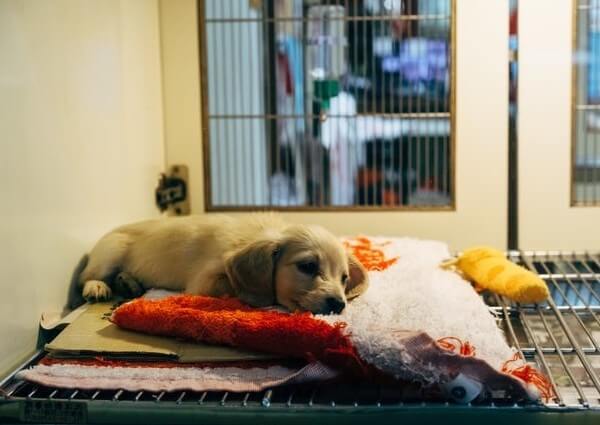
If your puppy is experiencing one or more of the following signs and symptoms, you’ll want to contact your vet immediately or take your puppy to the vet right away. Time is of the essence so that your puppy can get treated quickly.
1. Vomiting frequently with blood in it
Usually, the first sign of parvo in puppies is if your puppy starts to vomit frequently. The vomit can come in various colors and textures. You may see brown, yellow, or even clear-colored vomit.
Handy Hint: Your dog’s vomit can tell you a lot about why your pup is feeling sick. Check out Dog Vomit Color Guide to learn more and use it as a resource whenever your puppy is feeling sick.
2. Frequent bloody diarrhea
Puppy with parvo may have bloody diarrhea very frequently. Your puppy’s diarrhea may even be mustard-colored or light yellow.
3. Drooling excessively
In addition to vomiting and having diarrhea, your puppy may drool excessively and even foam at the mouth. His or her nose will be running as well.
You might also like: Pink Spot On Dog’s Nose – What Does It Mean?
3. Loss of appetite
When your puppy has parvo, he or she will lose their appetite even if you’re offering them their favorite food. Most likely your puppy isn’t heading over to her food bowl and seems very disinterested in their food when you’re trying to hand feed it to them.
Since your puppy usually devours their food, this sign can be worrisome for many owners. You’ll want to consult with your vet right away about this. Even if your pup does manage to eat, he will most likely throw up what he just ate.
4. Weight loss
As a result of not eating due to a loss of appetite, your puppy may start to lose weight. You may see his ribs popping out or showing even though the belly appears to be big and bloated.
4. Dehydration
In addition to not eating, puppies with parvo may refuse to drink water as well. When this happens, it becomes a serious problem. That’s because your puppy can get dehydrated from not drinking water and from both diarrhea and vomiting symptoms.
Puppies can’t go for long without eating or drinking so we highly recommend that you contact your vet right away. Your vet will examine your pup and get him hydrated using a syringe to feed him water. Your vet may even give your puppy electrolyte liquid to keep your puppy hydrated.
5. Fever or hypothermia
When it comes to canine parvovirus, one of the most common symptoms is fever. To find out whether your puppy has a fever, you’ll want to gently touch his head and around his ears and feel his temperature. If his head and around his ears is hot, then your puppy may have a fever.
In addition to the head, you can also gently touch his belly. Since there is less fur on the belly, it’s easier for you to gauge his body temperature. If your puppy has a fever, then his belly will be very warm and may even feel a bit sticky to the touch.
6. Abdominal pain and bloating
Your puppy may be hunched over because he may have abdominal pain. His abdomen may also look bloated and round. When you touch his abdomen, your puppy may start crying and yelping because the abdomen area is very sensitive.
7. Lethargy
Instead of being carefree, playful, and energetic, your puppy is lethargic and feeling down. He’s not interested in playing or being with other pets or family members. When you try to play with your puppy or pick him up, your puppy refuses to sit up and will lie back down.
Can a puppy survive parvo?
Yes, a puppy can survive parvo provided that dog owners take appropriate measures. Within 2 to 3 days (48 to 72 hours) of contracting parvo, it’s important that you seek immediate medical attention for proper diagnosis and treatment. If parvo isn’t treated within this time frame, your puppy can become very ill and die.
What is the survival rate for parvo in puppies?
Fortunately, the survival rate for parvo in puppies is pretty good. Your puppy has a 68 to 92 percent chance of survival if parvo is treated by a veterinary professional. Additionally, puppies that make it past the first 3 to 4 days will most likely recover fully and completely.
Signs your puppy is getting over parvo
After the fourth day, you may notice your puppy’s feces becoming more firm without any blood on them. He may stop throwing up and become interested in food again. Additionally, your puppy may gain back his energy and become more active and playful. These are just a few parvo recovery signs and they are all good signs of parvo recovery.
Since canine parvovirus is an extremely fatal and contagious disease for our puppies, it’s important to keep an eye on them especially during their first 12 weeks of life when their body and the immune system are not strong enough yet.
Try your best to avoid getting your puppy in contact with other dogs that are unvaccinated. In the worst-case scenario where your puppy did get parvo, you’ll want to bring him to the vet as soon as you can so that he can be treated immediately.
Immediate medical attention and treatment, in this case, are necessary if your puppy has parvo.
You may also be interested in: Puppy Has Diarrhea But Still Playful
How long does parvo last in a puppy?
After your puppy has been exposed to parvovirus, it may take 10 to 14 days before the above parvo symptoms appear. If your puppy makes it past the first 4 days, his chances of recovery seem bright.
Expect at least 7 days for a puppy to recover fully from parvo. It also depends on the type of treatment your puppy received. Let’s discuss this next.
Can puppies survive parvo with treatment?
Yes, puppies can survive parvo with treatment. If you suspect your puppy has parvo, be sure to take him to the vet immediately. We can’t stress that enough. Time is of the essence if your puppy ends up with parvovirus.
Your vet will be able to find proper treatment immediately and this also means that your puppy will be able to recover quicker. Your puppy’s body and immune system are still developing by the day which makes them susceptible to diseases like parvo and may take them longer than usual to recover.
Parvo treatment success rate
The parvo treatment success rate really depends on the treatment received. If your puppy is treated immediately or early enough at the veterinary hospital, then he may have a 90% chance of recovery (provided that he survived the first 4 days).
Your puppy’s success rate may be a bit lower if you prefer to go with the home treatment route. Some owners prefer to cure parvo without a vet for their dogs at home due to financial reasons and this lowers the chances for recovery to 85%. Be sure to stay attentive and follow your vet’s instructions carefully and completely.
How much does it cost to treat my puppy with parvo?
We highly recommend that you sign up for health insurance for your puppy because parvo treatment can be pretty expensive. Treatment for canine parvovirus can cost you anywhere from $500 to $2,500. Depending on how long your puppy needs to stay in the hospital, the cost can increase and add up.
Many pet owners without health insurance for their precious puppy are left with very little option as this treatment is costly and can be beyond what they can afford. In this case, they may opt to euthanize their puppy to put their precious pooch out of pain and misery. This is unfortunately one of the most painful decisions any dog owners or dog lovers have to make.
Thus, it’s crucial that your puppy is fully vaccinated to prevent canine parvovirus.
Here’s a breakdown of why parvo can be so costly:
- Parvo testing to properly diagnose the disease can be up to $300.
- Treatments such as medications, intravenous (IV) drips, hospitalization, or other procedures can be $400 to $500.
- If the treatment plan isn’t working for your puppy, your vet may decide to go with a blood plasma transfusion which can further cost up to $1,000 a day.
This is why many dog owners would rather treat their puppy for parvo at home to avoid the high in-hospital treatment costs. This helps to bring down the costs of treating their puppy for parvo significantly.
Can a puppy survive parvo without treatment?
The mortality rate for a puppy with parvo who did not receive treatment is more than 80%. This is why we highly recommend that your puppy is treated immediately after getting infected with this fatal disease.
Can puppies recover from parvo?
As we can see, puppies can recover from parvo if they have been diagnosed properly and treated on time. Treatments can include in-hospital treatments or at-home treatments. Since in-hospital treatments can cost you hundreds if not thousands, many dog owners choose the at-home treatment route.
What to feed a puppy recovering from parvo?
First and foremost, you’ll want to make sure your puppy is well hydrated so you’ll want to feed him water when he’s recovering from parvo. You can hand-feed your puppy water with electrolytes in small doses.
Second, home-cooked meals like white rice and boiled chicken are great because they are plain, nutritious, full of protein, and easy to digest. The white rice will also settle in the stomach more easily. Another great option to feed your puppy recovering from parvo is pasta and fat-free cottage cheese.
Be sure to also consult with your vet and stick to a meal plan that your vet recommended.
Puppy survived parvo, now what?
If your puppy survives parvo, you’ll be glad to know that it’s pretty unlikely that he will get parvo again. After your puppy has been infected with parvo, he will build immunity to this disease and it usually lasts for more than 3 years.
The good news is that most puppies that fully recover from parvo will not have any long-term or lasting problems.
DISCLAIMER: THIS WEBSITE DOES NOT PROVIDE MEDICAL ADVICE
The information, including but not limited to, text, graphics, images and other material contained on this website are for informational purposes only. No material on this site is intended to be a substitute for professional veterinary advice, diagnosis, or treatment. Always seek the advice of your veterinarian or other qualified health care provider with any questions you may have regarding a medical condition.
Resources:

With over five years of specialized experience as an animal writer, my expertise lies in dog nutrition, health, behavior, grooming, and training. I am dedicated to delivering helpful and informative content that caters to the well-being of our furry friends. My primary goal is to empower pet owners with knowledge and ensure our canine companions thrive in health and happiness. In my free time, I love volunteering at local dog rescue centers.
